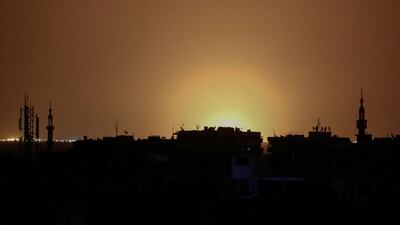BEIRUT // The Syrian government and Hizbollah have blamed Israel for a pre-dawn air raid near Damascus airport on Thursday.
The Syrian state-run Sana news agency said Israeli warplanes “in the occupied territory” – assumed to refer to the Golan Heights fired two missiles at a military position near Damascus International airport, which is about 25 kilometres south-east of the Syrian capital. No casualties were reported.
Earlier, Iran-backed Hizbollah, which has forces fighting in Syria as allies of president Bashar Al Assad’s government, also said the explosions near the airport were probably caused by an Israeli air raid.
A video of the attack circulated on social media on Thursday showed explosions followed by a fire lighting up the night sky.
Hours later, Israel shot down what it identified only as “a target” over the occupied Golan Heights.
“The Patriot Aerial Defence System intercepted a target above the Golan Heights,” said the official Israeli army Twitter account, without elaborating. A military spokeswoman refused to comment on Israeli media reports that the object was a drone that had infiltrated from Syria.
Damascus International Airport once received flights from across the region and the world, but major carriers cut their routes to the city as the country’s war worsened. The airport still services several Syrian carriers operating both domestic and international flights, along with Iranian and Iraqi airlines. But the war has also transformed the airport into a hub for military traffic and arms shipments.
Rebel and intelligence sources told Reuters said Thursday’s strike hit a Hizbollah arms depot near the airport.
Israel did not claim responsibility for the attack, but its intelligence minister Yisrael Katz told army radio that the strike appeared to be in line with Israeli policy on Syria and confronting Hizbollah’s presence in the country.
“When we receive serious information about the intention to transfer weapons to Hizbollah, we will act. This incident is totally consistent with this policy,” he said.
Moscow, which also has forces on the ground in Syria fighting on the side of president Al Assad, denounced what it called “ aggression” against Syria but avoided blaming Israel directly.
“Moscow condemns acts of aggression against Syria and calls on everyone to act within the framework of respecting the sovereignty and territorial integrity of Syria,” said foreign ministry spokeswoman Maria Zakharova
Over the course of the war in Syria, Israel has taken the opportunity to attack Hizbollah forces on numerous occasions, targeting arms transfers to the group and carrying out assassinations. For Israel, which fought a 34-day war with Hizbollah in 2006, the attacks have been seen as a relatively risk-free way to degrade the Lebanese Shiite group’s capabilities while it is too bogged down in the fighting in Syria to mount a response.
Israel has also attacked Syrian government forces, but such incidents are often a retaliation to cross-border fire.
Last Sunday an Israeli attack on a Syrian military training camp in the Golan Heights killed three fighters. Israel said it was a response to mortar fire that hit Israeli-occupied areas of the Golan Heights.
Both Damascus and Hizbollah have promised to respond to Israeli provocations in Syria, but their preoccupation with the war means they have not yet done so in any significant manner.
Hizbollah, which was founded in the 1980s to confront Israeli troops occupying Lebanon, has in recent years turned its attention toward the war in Syria, where it is fighting sectarian-fuelled battles on behalf of the Assad regime. The group has deployed thousands of fighters to Syria and sustained significant losses. But it maintains that it is still prepared to fight Israel if need be.
Last week the group took dozens of Lebanese and foreign reporters on a trip to Lebanon’s southern border with Israel in a bid to show them it had not forgotten about its original enemy. Hizbollah fighters brandishing weapons – including a shoulder-launched surface-to-air missile – were on display and a Hizbollah officer said that while the group did not want war, it was ready for it.
“We do not fear war, we don’t hesitate to confront it. We yearn for it and we will confront it if it is imposed on us,” a Hizbollah military commander said, according to Agence France-Presse. “And God willing we will win.”
Elsewhere in Syria, activists said air raids across the opposition-held Idlib province killed at least 19 people on Thursday, with some targeting ambulances and medical centres.
The Civil Defense, a search-and-rescue organisation, said four medical staff were killed in an attack on a university hospital in Deir Sharqi, and another four paramedics or ambulance operators were killed in a strike on an ambulance services charity in Maarzita.
The activist-run Idlib Media Center said another four people were killed by barrel bombs dropped on the town of Khan Sheikhoun, the site of a chemical attack earlier this month.
jwood@thenational.ae
* With additional reporting by Associated Press, Reuters and Agence France-Presse

